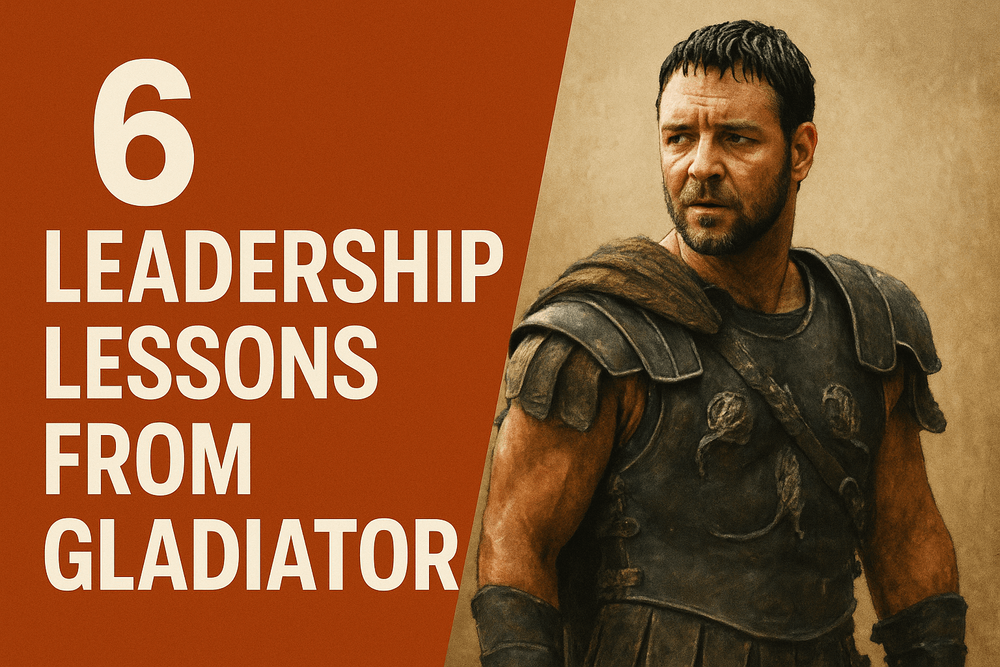I first saw the movie Gladiator at the theater back in 2000, the same year my daughter was born. Russell Crowe and Joaquin Phoenix were outstanding actors, but part of the movie’s appeal for me were its leadership lessons. The struggle between good and evil was starkly contrasted in the characters of Maximus and Commodus and the differences in their leadership styles.
In Gladiator, Maximus is the leader of Rome’s armies and the favorite of Emperor Marcus Aurelius. He is a man of courage and honor and is revered by all who know him. Commodus is the conniving son and heir to the throne of his aging and sick father. When Commodus learns his father intends to appoint Maximus as emperor after his death instead of him, Commodus murders his father, has Maximus’ wife and son murdered, and nearly succeeds in having Maximus killed. Maximus survives but becomes a slave and gladiator who will most likely die in the Colosseum to the amusement of the bloodthirsty crowds of Rome.
While clearly the movie was made to entertain, it is also a Master Class in what makes a great leader.
1. Lead by Example
A leader is willing to do whatever it takes to get the job done. No role is beneath them so long as it moves the organization forward. Obviously, the CEO of Google isn’t writing code to tweak their algorithm, but in most organizations, there are often ways to lead by example.
Years ago, when I was running a call center company, whenever I would visit one of our facilities, I would always spend my first hour on-site taking calls. I wasn’t very good at it and I made some mistakes, but it had the intended effect. It sent the clear message to the customer service team members that their job mattered and was important to the company. Over the years, I was shocked by how many people from that team came up and told me how much they appreciated this small act.
In Gladiator, the movie opens to Russell Crowe’s character, Maximus, on the precipice of a deadly battle with his soldiers against a determined enemy. He gives a stirring speech to motivate the men but the visual of Maximus galloping on horseback roaring “Hold the line! Stay with me!” as he leads his troops into battle makes it clear that Maximus would never ask his men to take a risk he was unwilling to take himself. This is not lost on his soldiers and their resulting admiration and loyalty towards him illustrates the power and impact of “leading from the front.”
Commodus, on the other hand, intentionally shows up after the battle has been won and there is no longer any danger. He feigns surprise:
“Have I missed it? Have I missed the battle?”
Marcus Aurelius, himself old and fragile but who was also at the battle, responds, his voice dripping with contempt:
“You have missed the war.”
2. Be Someone People Trust and Respect
Many “leaders” in today’s organizations have an autocratic, fear-based leadership style. While this can be effective in the short term, it will not breed loyalty. When people operate from a place of fear, they only obey because they believe they have no choice.
Given the current employment situation and the “Great Resignation” plaguing US companies, as soon as another opportunity presents itself, people will leave. In the long term, individuals will only voluntarily follow someone they trust and respect.
But what are the core aspects to gaining someone’s trust and respect?
Maximus provides one of the best frameworks of how to gain the trust and respect of others. First and foremost, he is trusting and respectful. Before the battle, Maximus walks among his troops. He knows their names, asks after them, acknowledges their courage and loyalty, and expresses his solidarity with a look, a word or a touch.
While Maximus is clearly higher status, he wears his authority lightly.
Maximus believes it is his job to protect and lead those who have chosen to follow him. He never loses sight of the fact that it is he who serves them and not the other way around.
Trust and respect also come down to everyone playing by the same rules. In so many organizations, there are two sets of rules; one for executive leadership and one for everyone else. This “do as I say, not as I do” approach is demoralizing to the members of any organization.
Many of us have worked in organizations where some leaders are a no-show to a meeting, and it’s no big deal. However, if someone is five minutes late to a meeting they are on time for, that same leader has a meltdown. Or an executive who pushes to arbitrarily cut payroll by 10%, but always flies private, has three personal assistants and spends $250,000 redecorating their office.
When a leader is a person of their word, and the team knows they can trust what their leaders tell them and largely play by the same rules as everyone else, a bond of trust and respect is created that can help take any organization to the next level of performance.
Be a person of your word. Mean what you say and say what you mean.
3. Maximize Performance by Honoring the Individual
Great leaders are not focused on themselves. Their “servant leader” mentality won’t allow it. Competent leaders know they add tremendous value and are never worried about others replacing or eclipsing them; in fact, it is the opposite. Great leaders understand that honoring the individual and nurturing their abilities and interests is the best way to maximize the performance of their team and their organization.
While it is a cliché, one of the things that make a leader stand out is being someone who surrounds themselves with people who are better than they are. Prioritizing one’s standing by surrounding oneself with inexperienced or less-skilled individuals is a symptom of a leader who is ill-suited to their position of authority. While this approach may provide some job security in the short term, these leaders never last.
Dell Computer is a great example of this. Michael Dell, for all his brilliance, surrounded himself with mediocre and uninspiring leaders. Because of those choices, he put Dell Computer on a path toward complete failure and was nearly ousted from the company he built from the ground up. After Dell’s board of directors forced him to bring in an A-Team of executives, Michael Dell is now one of the richest men in the world.
4. There Is No Losing, Only Winning or Learning
Real leaders only see two possible outcomes in all situations. Winning or learning. Losing can only happen when you give up. Leaders always find the best in every situation and look for solutions, not scapegoats. When things go well, they feel fortunate—not superior or special—and are humble enough to know it could have gone the other way. When things go badly, they look for their part in how things went wrong and how they can shore up their weaknesses to avoid similar outcomes in the future.
Maximus epitomizes leadership in all of these areas. He behaves the same regardless of his status as the top general of the Roman Empire or as a slave, indentured to fighting to his own demise. True leadership is more than a title. Maximus is a leader no matter what his station.
Maximus inspires those around him and he puts forth a vision and a plan and does so with passion. “Strength and honor” is his mantra to his fellow slaves and gladiators that have known neither for a long time. He sees in them what they cannot see in themselves. Because of their trust and respect for Maximus, they begin to believe in themselves and their cause in a way that would have been impossible without him as their leader.
Before Maximus joined their ranks, all of the gladiators were doomed to certain death. Now they can all see the possibility of escaping and having a future.
5. Leadership Opportunities will Find True Leaders
Perhaps paradoxically, the best leaders often don’t seek to be the boss. They are almost reluctant leaders as they see true leadership for what it is—both a privilege and a burden. The person who is always politicking, scheming, and maneuvering for positions of power and authority will usually make the worst leader and can often destroy a company.
Again, Maximus sets the perfect example.
After his final victory, when asked by Marcus Aurelius, “How can I reward Rome’s greatest general?” Maximus replies simply, “Let me go home.”
The emperor responds, “There is one more duty that I ask of you before you go home. I want you to become the protector of Rome after I die…will you accept this great honor that I have offered you?”
After a thoughtful pause Maximus replies, “With all my heart, no.”
Marcus Aurelius gently cups Maximus’ face in his hands, looks him deeply in the eyes as a loving father would to his favorite son, and says, “Maximus, that is why it must be you.”
Great leaders assume the mantle of leadership when they believe it is what is best for the organization. Not what is best for themselves.
6. Create an Environment for Others to Succeed
Finally, great leaders understand that to create the circumstances for exceptional outcomes, one must pursue something greater than one’s own desires. The whole must be greater than the sum of its parts. The goal must be bigger and more inspiring than any one person could achieve on their own. People follow passion, not profit. Leaders must bring passion and vision, but they also need to bring a plan.
The best leaders create an environment and structure for others. They create a game plan for others to follow such that if individuals do their job and do it well, they will thrive and succeed. The leader won’t do the work for you; it is the individual’s success. But make no mistake, it is on the back of real leadership that most victories worthy of admiration are built.
Final Thoughts
One criticism I am certain this article will generate is in regard to the Steve Jobs, Elon Musks, and Jeff Bezos of the world who don’t lead this way. They are among the most successful CEOs in all of human history. They are also notoriously known as self-involved jerks who treat their top talent like crap.
My rebuttal is simple. Anyone with even average ability but high emotional intelligence can employ Maximus’ leadership style. I would argue that what people like Elon Musk are able to accomplish can only be done by a tiny fraction of the population. When you have that much talent, people will follow you because of your abilities in spite of your terrible leadership skills.
Shortly before the Emperor’s murder, Marcus Aurelius shares his fears with Maximus about what his legacy might be.
“I am dying, Maximus. When a man sees his end, he wants to know there was some purpose to his life. How will the world speak my name in years to come? Will I be known as the philosopher? The warrior? The tyrant?”
The reality is that one cannot create a lasting legacy of meaning at the end of one’s life. One must pursue it over a lifetime. While people can disagree about whether a legacy is even possible, any form of legacy one can imagine must begin with leadership.
Again, Maximus offers the perfect pearl of wisdom:
“What we do in life echoes in eternity.”


